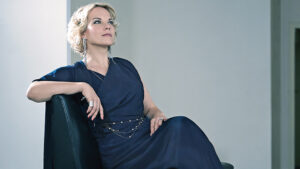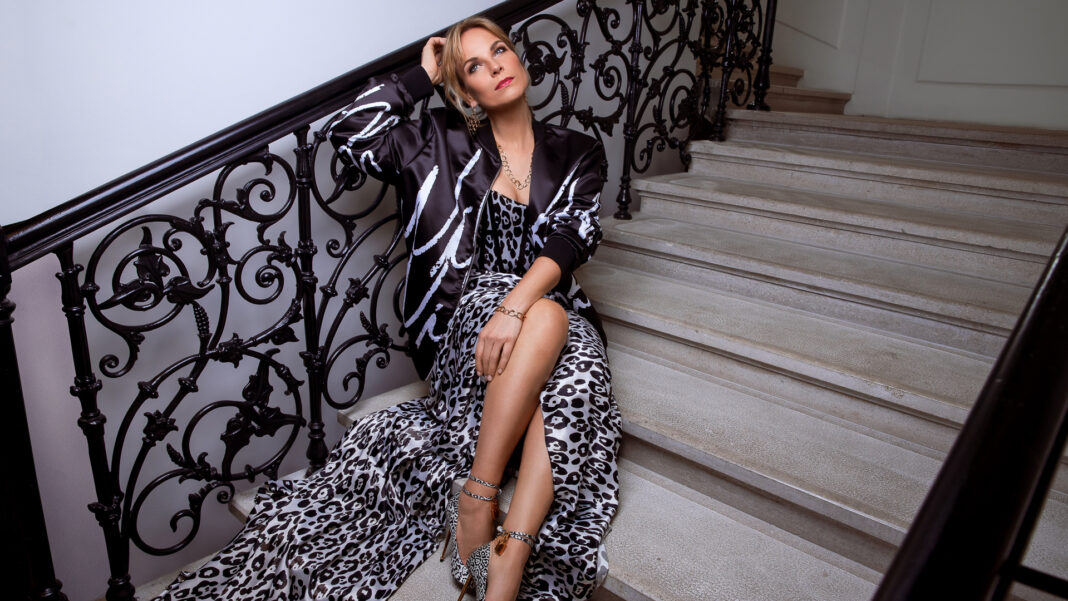
I hadn’t necessarily planned on discussing politics with mezzo-soprano Elīna Garanča, but it was inevitable that during our conversation earlier this week the subject would arise. One of opera’s most highly-acclaimed mezzo-sopranos, the Latvian-born Garanča is deeply concerned about what’s going on in neighboring Ukraine. She’s also thinking about the presence of Russian composer Sergei Rachmaninoff’s music in her upcoming recital at The Broad Stage in Santa Monica on Tuesday, March 15th.
“Particularly today the Russian political situation is difficult and artists are very often challenged nowadays: is the Russian music allowed to be performed?” she pondered during our conversation. “We kept it because this program was announced long before the disaster that’s going on at this very moment happened. I was thinking the music per se is not at fault, and the literature and art per se is not at fault. Latvia has a lot of rooting into this music and this wide soul. We are sentimental and we are melancholy some times. I find that Rachmaninoff particularly has written incredibly beautiful [music] for a mezzo-soprano voice. So why not? I will try then to to give the feeling of how I see Rachmaninoff.”
Garanča, who will be accompanied by Malcom Martineau on piano, has conquered many of the major roles for mezzo-sopranos including Dalila in Samson et Dalila, Margueritte in La Damnation de Faust, Kundry in Parsifal and, of course, the title role in Carmen.
When asked if there’s any role she’s terrified of doing she revealed her nerves of steel and that her dream role will soon become a reality.
“I think I’m too old to be terrified. No, I’m not terrified. I still would like to do Amneris [in Verdi’s Aida] which has been my dream role. Regrettably up to now it still hasn’t happened. Hopefully it will happen in 2023 in January. I’m curious about somebody like Azucena from Il Trovatore because I think it will be very interesting to play. I think it will be interesting to do somebody like Ortrud [in Wagner’s Lohengrin] or Mistress Quickly [in Verdi’s Falstaff]. But I have to say for me Amneris, because I haven’t sung the most exciting and most beautiful role. I always said when I sing it, that’s all. I’m ready to stop singing because I have achieved that goal and that mountain that I wanted to achieve and reach.”
Not that Garanča will retire. But after several years of singing that role she will consider switching to recitals and recordings. Fellow mezzo-soprano Cecilia Bartoli compared an opera singer’s voice to a fine wine that has to be aged. Garanča thinks there’s more to it than that.

“I can agree that you have to give time to develop, but just time will not do it. You have to work really on that. You need to adjust technique, you need to research repertoire, you need to push your limits sometimes and you need to challenge yourself, you know? Twenty-five or 30 years ago when I started to actually think about singing I never thought that I will be able to make such a big circle of starting really with Baroque and Mozart and bel canto and really to end up in Wagner.
“It’s not my, how should I say, continuous repertoire, but you know, I’ve started to develop and sing it. But it’s not just like I’m sitting and waiting. I had to work a lot for that, then I had to go to many coaches and many lessons with the teachers.”
Her first recording, Arie Favorite, was released over twenty years ago. In order to look forward often requires looking back. When Garanča does that she has a full understanding of how her voice has matured.
“If I listen now to some of my earlier recordings I still remember that feeling going on and my thinking, Oh my God! Now I listened to some of the things actually, not that bad really. Probably the thing is that you’ll learn to also love your aging instrument. You realize and you accept that certain things are not anymore possible. But I don’t get sad about it because there are so many more things that I can do with it now. And I believe that the voice is also what you are as a person and your personal experiences. Your life experiences also translate in how you sing and how your body becomes and how your personality as a singer becomes.”
If she has concerns it is about the challenges artists have to face in a world where it is becoming increasingly difficult to navigate a prickly public.

“When I voice my voice or I express myself, I do not think about if it’s now politically correct or it’s artistically correct. My heart needs to express it and it’s for my own dignity. I think the human being at this very moment is living in this consumer society that very quickly switches from right to left and from left to right. We are very limited in seeing different colors in between. It’s either white or black and I think that at some point that also has to change because we are all different and we all should have the right and must have right to live life and be free of expressing.”
Garanča goes on to explain that this doesn’t just impact the artist, but also the art.
“Also, art in a way is suffering in that respect. Before actually believing and listening to the message that art actually wants to give we start to take it apart. Are we correct in this way? Are we correct in that way? If we do that do we offend this part of the humanity or can we challenge this part? And I think it loses its purpose. We are there to communicate with emotions. We are there to transport. We are there to support history, the imagination of somebody. And if it all gets just corrected by politics, it loses its purpose.”
Though her idol Christa Ludwig once described opera as “an impossible art – if you can say it is an art at all,” Garanča still firmly believes in the power of a great production of a great opera. In other words, in her art.

“You know what? Music has its magical power that when all of the ingredients suit to each other – meaning conductor, staging, costumes, voice – that’s so magical. Where you say, ‘Oh my god, it’s already finished. I didn’t notice how quickly or how long the opera was.’ You know what I mean? It just went in one breath from their first moment down to the last moment; from the joyful meeting up to the death of one or the other one. It was just one breath and we aim to give those nights and they become special and then art.”
To watch our full conversation with Elīna Garanča, please go to our YouTube channel here.
For tickets and more information on Garanča’s recital at The Broad Stage, please go here. She will be performing Mahler’s Rückert-Lieder with the Chicago Symphony Orchestra March 31st – April 5th. For details go here. At the end of May Garanča will begin performances as Dalila in Saint-Saëns’ Samson et Dalila at The Royal Opera in London. For details go here.
Main photo: Elīna Garanča (© Sarah Katharina)











